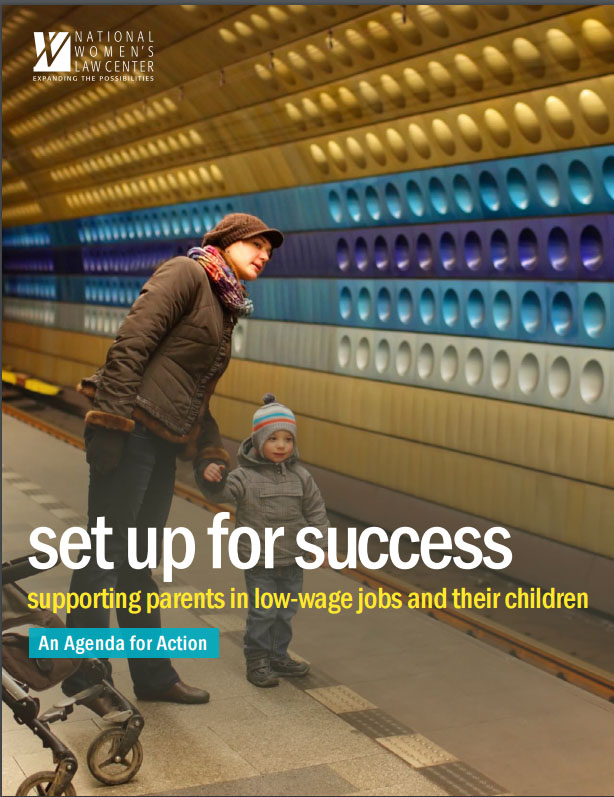Set Up For Success: Supporting Parents in Low-Wage Jobs and Their Children

 Today, too many working families are set up to fail. Millions of parents across the country work in jobs whose low wages, unfair scheduling practices, and minimal benefits make it difficult to meet both work and caregiving responsibilities. The challenging working conditions of many low-wage jobs often leave parents struggling, without time to spend with their children and resources to afford the high-quality early care and education their children need to succeed in school and beyond.
Today, too many working families are set up to fail. Millions of parents across the country work in jobs whose low wages, unfair scheduling practices, and minimal benefits make it difficult to meet both work and caregiving responsibilities. The challenging working conditions of many low-wage jobs often leave parents struggling, without time to spend with their children and resources to afford the high-quality early care and education their children need to succeed in school and beyond.
A new action agenda from NWLC recommends policies, practices, and strategies that have the potential to improve lives across multiple generations—and provides examples that have been advanced and implemented by advocates, policy experts, researchers, private sector representatives, and low-wage workers themselves.
The recommendations in Set Up for Success: Supporting Parents in Low-Wage Jobs and Their Children are intended to further five critical goals:
- Increase parents’ incomes.
- Ensure parents are treated fairly in the workplace and have stable, predictable work schedules.
- Expand children’s access to high-quality, affordable child care and early education.
- Expand parents’ access to paid sick days and paid family and sick leave.
- Improve parents’ opportunities to obtain education and training that can help them advance into better jobs.
Each of these goals is essential to supporting low-wage working parents in their efforts to provide for their families and promote their children’s growth and development.
Reaching these goals will require federal, state, and local policies and investments —and progress is already being made on these fronts. For example, federal legislation to raise the federal minimum wage is pending in Congress, and California and New York recently passed legislation to raise their minimum wages to $15 an hour statewide, in response to workers’ Fight for $15 campaign. In San Francisco, workers in many retail, restaurant, and hospitality jobs are guaranteed at least two weeks’ notice of their work schedules, with additional pay for last-minute schedule changes, under the Retail Workers’ Bill of Rights passed in 2014, and, if passed by Congress, the federal Schedules That Work Act would create similar protections for workers across the country. In addition, the Child Care Access to Resources for Early-learning (Child CARE) Act pending in Congress would expand investments to help low-income families afford high-quality child care. Further progress, in the form of increased funding for the major federal child care program, the Child Care and Development Block Grant (CCDBG), to provide child care assistance to more families, raise child care provider payment rates and compensation, and strengthen the supply and quality of child care will also be essential—especially in light of new requirements imposed by the 2014 CCDBG reauthorization that have the potential to improve child care access and quality, but that will require additional resources to implement.
In addition to these efforts, advocates, researchers, businesses, and worker justice groups across the country have advanced and implemented other promising strategies. For example:
- WorkJam, an enterprise software company, offers scheduling technology that can enable hourly employees to have more control over their schedules and reduce labor costs for businesses.
- In New York City, 1199 Service Employees International Union (SEIU) United Healthcare Workers East maintains a child care fund to which employers contribute, pursuant to collective bargaining agreements, that funds affordable child care for union members.
- Patagonia provides paid family and medical leave for its employees, and has publicly advocated for the passage of the federal Family and Medical Insurance Leave (FAMILY) Act. If enacted, the FAMILY Act would provide paid benefits equal to two-thirds of workers’ typical monthly wages (up to a capped monthly amount) for family and medical leave.
- Project ARRIBA in El Paso County, Texas, provides job training and case management services to eligible county residents to prepare them for high-demand jobs—and it pays for the child care that its participants need to engage in education and training programs.
- Non-profit organization B Lab and worker justice organization the National Domestic Workers Alliance have created certifications to designate employers that provide better working conditions—including pay, benefits, schedules, and autonomy for their workers.
By building on and broadening these and other efforts described in Set Up for Success, stakeholders can work together across sectors and disciplines to set families up to succeed.



